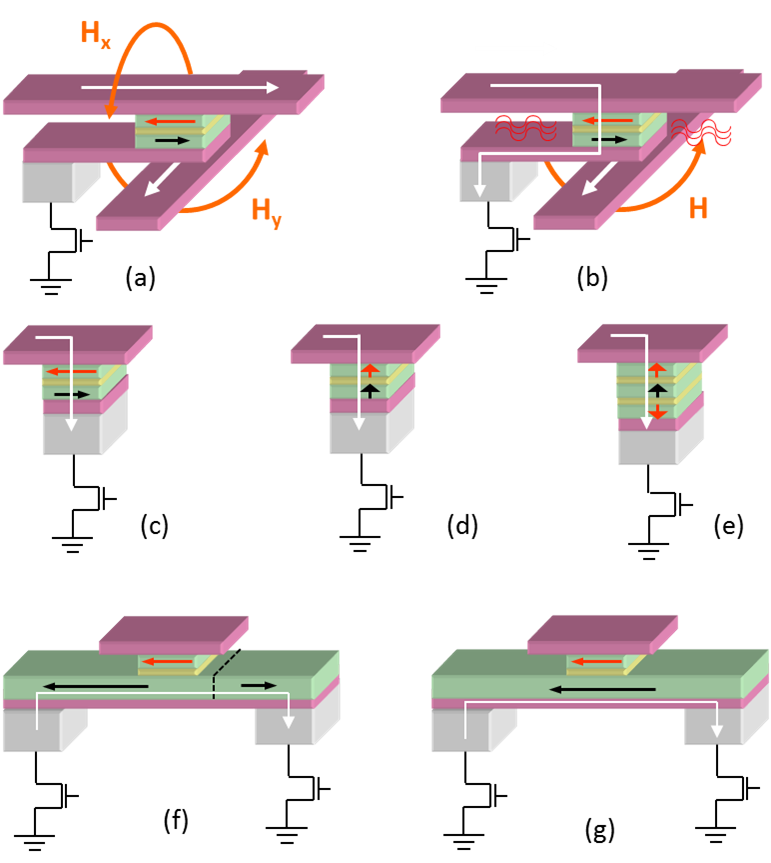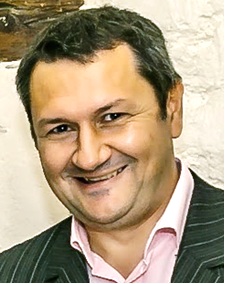Thematic overview
Magnetic Random Access Memories (MRAM) is a non-volatile memory technology, where information is stored by the magnetization direction of magnetic electrodes, very similar to computer hard-disk drives. The goal for MRAM memory is to simultaneously achieve high-speed read/write times, high density and unlimited cycling compared to other existing and emerging technologies.
Our group is developing advanced MRAM cell concepts patented at Spintec. The concepts are based on the use of temperature to reduce power consumption and increase the stability of the stored information. These ideas go beyond the conventional MRAM approach. The naturally occurring temperature increase during the write step is not lost, but is instead used to achieve the seemingly opposing goal of lowering the power consumption and increasing the thermal stability in the operating temperature range. Our group fosters young and experienced researchers developing/applying their expertise in the field of MRAM.

Questions to be addressed
Our main research axis is to use the naturally occurring temperature increase during the write step, when a current flows through the magnetic tunnel junction. The heating is used to go above a temperature threshold, making it possible to write the storage layer magnetization. This principle has been applied to in-plane magnetization cells using a storage layer pinned by an anti-ferromagnet and recently to perpendicular anisotropy cells. Our group’s goal is to demonstrate the proof-of-concept and then improve MRAM cell properties.
Our work involves the development of magnetic material systems, nano-fabrication (20-200nm cells), characterization of devices (magnetic & electrical) and simulation of the device behavior. Our activity in these vast fields is as follows;: On materials research, we are developing magnetic tunnel junctions with in-plane and perpendicular magnetic anisotropy. New electrode stacks having the material properties required by each specific concept need to be integrated in magnetic tunnel junctions, while achieving high levels of TMR signal. For the characterization of each concept we determine the write window parameters in terms of magnetic field, power consumption and magnetization reversal dynamics. Macrospin and micromagnetic simulation provide a better physical understanding of the system properties and the possibilities for optimization.
Projects
ANR EXCALYB – Perpendicular Anisotropy Materials for High-Density Non-volatile Magnetic Memory Cells
Crocus R&D – Thermally assisted MRAM
Samsung SGMI
Partners
Crocus Technology
Institut Néel
SP2M/NM
SAMSUNG
Applied Materials
SINGULUS
Recent news
- Seminar – Magnetic tunnel junctions using voltage control of the magnetic anisotropy for electric-field-controlled MRAM [July 26th, 2019]
Wednesday August 07 at 11:00 we have the pleasure to welcome Cécile Grezes, Electrical Engineering department, UCLA, Los Angeles. She will give us a seminar at CEA/SPINTEC, Bat 1005, room 434 entitled : Magnetic tunnel junctions ... - Electronics of the future [June 19th, 2019]
The journal of the French Society for electricity, electronics and information technologies (Société de l’électricité, de l’électronique et des technologies de l’information et de la communication) dedicated a special issue to Electronics of the future ... - Seminar – SOT-MRAM: from fundamentals to large scale technology integration [June 14th, 2019]
On Monday July 1 at 14:00 we have the pleasure to welcome Kevin Garello from Imec, Belgium. He will give us a seminar at CEA/IRIG, Bat 1005, room 445 entitled : SOT-MRAM: from fundamentals to large ... - [POSITION FILLED] PhD position – Exploring the scalability of spintronics for 3D devices [March 17th, 2019]
Topic Classical microelectronics is reaching its limits of downward scalability, reaching technological or scientific bottlenecks. Magnetic random access memories, based on magnetic tunnel junctions storing and reading bits of information, are emerging key ICT components. They ... - Impact of heating on the stability phase diagrams of perpendicular MTJs [February 19th, 2019]
Measured switching diagrams of perpendicular magnetic tunnel junctions exhibit unexpected behavior at high voltages associated with significant heating of the storage layer. The boundaries deviate from the critical lines corresponding to the coercive field, which ...

SOUSA Ricardo
ricardo.sousa@cea.fr

BALTZ Vincent
vincent.baltz@cea.fr

PREJBEANU Lucian
lucian.prejbeanu@cea.fr

DIENY Bernard
bernard.dieny@cea.fr





